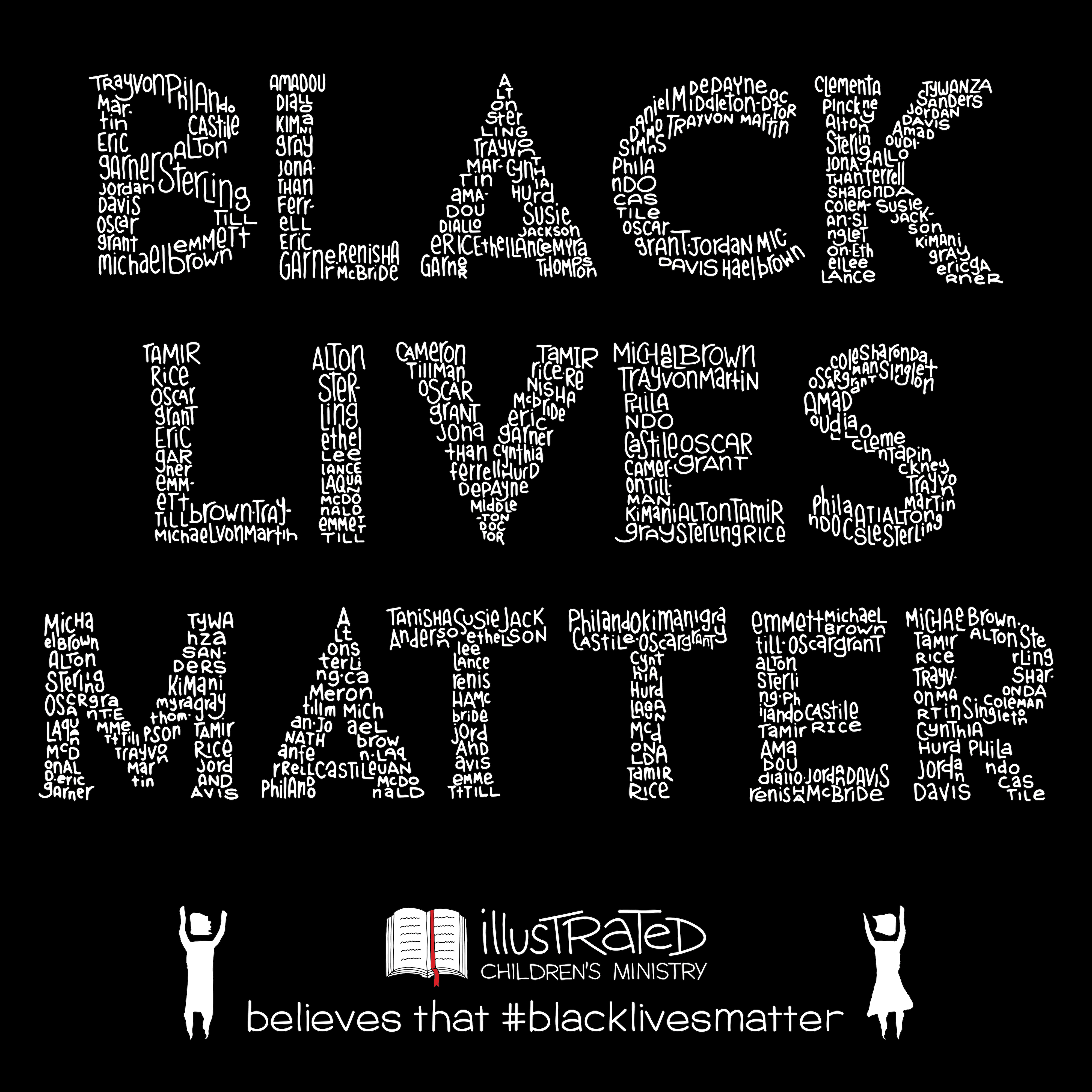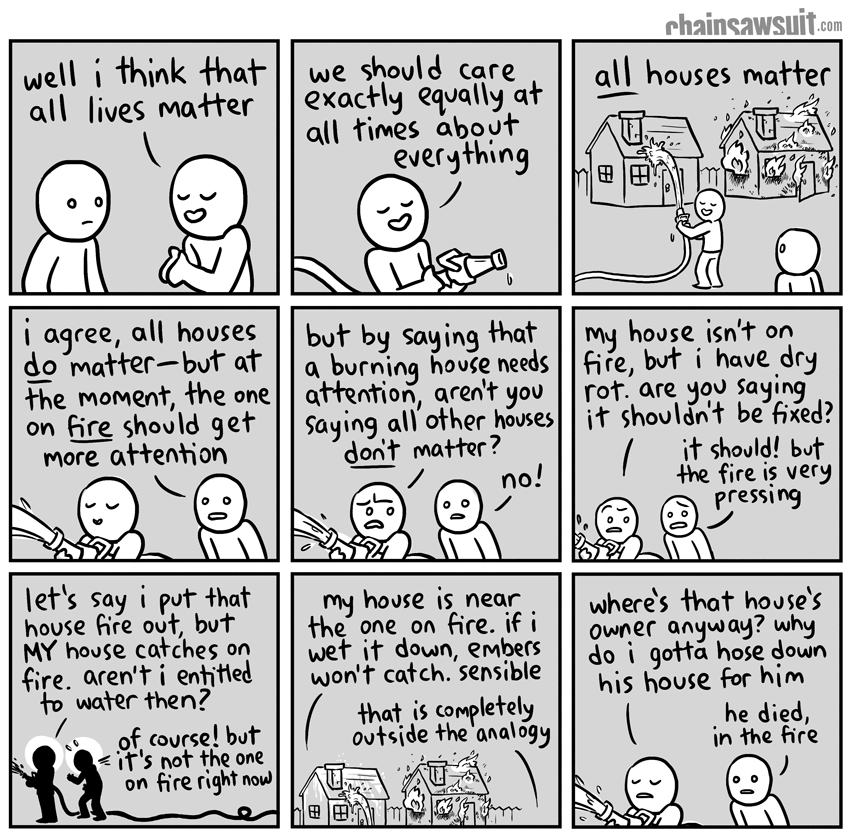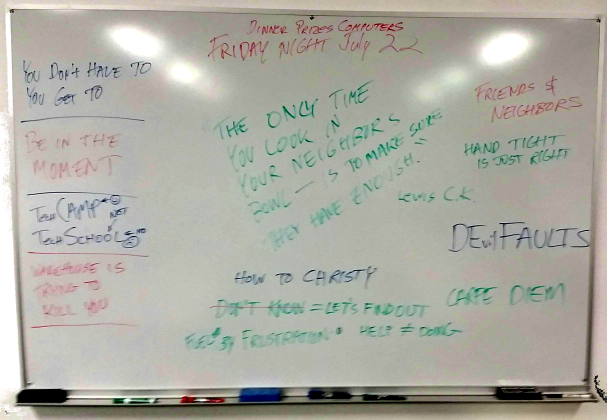 Rev. Sue Washburn writing in Presbyterians Today Sept/Oct 2016 p. 4
Rev. Sue Washburn writing in Presbyterians Today Sept/Oct 2016 p. 4
When the world goes dark, the faithful testify with their lives to the light of the world
Soul Opportunity
a sermon by Rev. J. Christy Ramsey
Click the title above for a mp3 recording
Audio from Lake Tahoe Community Presbyterian Church on November 13, 2016, text below edited from a flawless transcription made by edigitaltranscriptions all errors are mine.
Luke 21:5-19

Sermons also available free on iTunes
Sometimes, a doorbell just doesn’t work. Like when you get the pounding on your door at three in the morning, saying, “Get out of your house now. The fire is coming. We can’t promise to save your house, but we can save you if you leave with us right now.” And so you go. Will you come home? Will your home be all right as you left it? Will it be damaged? Will it be destroyed? Will there just be a patch of ground there?
Doorbells don’t work on terrible, awful, no-good days. Maybe you had one of them. Where is she? She’s supposed to be home by now. She’s never late. She always calls. What happened to her? Should I call the police? Should I call the hospital? You’re waiting. You’re not going to go to sleep. Where is she? Is she having too much fun? Or is she in an accident? Is she hurt, or worse? Did someone take her? Will she come home again? Are you worrying too much, or not enough? Terrible, awful, no-good things, the things that might happen, the things that might have already happened, the things that are going to happen. The terrible, awful, no-good days.
It seemed real special relationship. He really loved you. He wanted a special picture. So you took a private picture with your phone and sent it just to him. Now it’s all over Facebook. Now everyone at school has commented, either on what type of slut you are, how easy you are, how terrible you are; or some kind of rating system about your very body, whether you’re a four or six or seven. And then there’s other folks that go on and say all sorts of horrible, awful things they want to do to you because of that picture that you only sent to that one special one. What are you going to do? And what if your parents found out? Everybody at school already knows. You’re going to have to move. You can’t go back to school. What do you do when terrible, awful things surround you.
Your phone is your life. Your whole life is in there. You can’t imagine somebody has an app to find their phone. It’s never out of your hand. If you were to lose your phone, really it’d be like you lost track of your hand. Everything is there. You talk to your friends. You connect to your friends. You make plans about what’s going on. You find out what other people are doing. That phone is you. And you get up, and you look at it, and you and every other black freshman at Penn State have been invited to a lynching. A daily lynching. Are you coming, or are you not? Your phone wants to lynch you and everyone in your class who’s black. Who’s in this? Who did this? Who thinks this is funny? Are they going to kill me? Are they going to drag me out and kill me and everyone that’s black? Or are they just going to beat me up? I can’t even trust my phone, much less people.
Terrible, awful rumors of war. Times of trouble. What do Christians do? What have you tried? What has been tried on you? Oh, it’s nothing. Oh, you’re being too sensitive. Are you sure it happened that way? Don’t have such a thin skin. Oh, it’s not as bad as that.
What about someone who can’t go home? The person who said, well, you know, yeah, he hits me sometimes. But he doesn’t really mean it, and he always says he’s sorry. I mean, he doesn’t really, you know, really hurt me. Except that one, well, that couple times. But then he was really nice after. But then he started hitting my child. I can’t do that. I can’t go home. I’m not safe. My child’s not safe. I can’t let my child – risk my child. I’ve got to – what am I going to do? Where am I going to live? What’s going to become of me? Is he going to find me? Is he going to find my child?
Aw, give him a chance. Aw, you’re being oversensitive. You know, there are some things you did wrong, too, you know. You shouldn’t be talking about him that way. You should be more Christian. That’s the next step, isn’t it, that religious thing of dismissing and gaslighting, you know, telling you your reality isn’t true, what you experience is not real. Gaslight, you know, when you get all, say, wait a minute, is that really true? Did I really get beat up? Did I really get threatened to be killed? Did I really worry about my daughter? Did I really get shamed on Facebook?
The next thing, you know, the Christian stuff, it comes out, well – you’ve got to do your clutch your hands and say: “Well, you know it’s God’s will.” And there’s just a teeny, teeny, as appealing as that is to Presbyterians, is teeny, teeny bit step to go from that to saying that God is the author of evil and not of good. And I read from Genesis to Revelation that God created the world, and God created and looked at it and said it was good. God said it was good. Not you.
Telling somebody that’s hurting, someone that’s grieving, someone that fears for their life, someone that wonders if their parents are going to be deported, someone that’s crying, someone that wonders if they have to go back in the closet, someone that wonders and says, “Oh, my God, I got married, and now they know I’m gay.” To tell them, oh, it’s God’s will. Well, you ought to give them a chance. Well, you got too upset. Well, well. That helps you. That doesn’t help them. And that’s all right. We all need that. We all need what we need. But be aware that when you talk about those kind of things, that they really should be behaving better, oh, they really should give them a chance, oh, this on that, you know, you really should look on the bright side of the death. That’s helping us. That’s not helping them. Be aware of that.
Well, gee, Christy, what do we do? It’s in our Scripture. Sometimes it isn’t the first time when people are upset. You know, this lectionary was chosen years ago to come up today, way back 50 years ago, whatever the lectionary is, come up today, the Sunday after the election. Whoo, wars and catastrophe and terror and awful. Last week I looked at it, and I said, well, whoever wins, half the people are going to be, you know, happy; half are going to be unhappy; and half didn’t vote.
Three halves. But it’s emotion, not math. You know, it’s going to be a difficult Sunday, and what do I have to tell the people? Well, it’s in the Scripture. Jesus tells us in the Scripture. Testify. You know, he’s kind of like me. When my children or the youth group or anybody that – the campers, and you know this, they say “Do I have to?” What do I tell them? You get to. You don’t have to do this. You get to do this. And so all these horrible, awful things are happening, and you say, “Jesus, give us a word. What do we do? Do we be fearful? Do we be scared? Do we fear? Do we fly? Do we get out of here? Do we run? Do we fight? What do we do, Jesus? Do we fear? Do we fight? Or do we flee?”
And Jesus says, “Good news. You get to testify.” You have an opportunity, as the New RSV says, you’ve got an opportunity to testify ‘cause there is no time better to shine a light, when things are dark. You have an opportunity to shine, church. You have an opportunity to shine, Christian. You have an opportunity to testify. And you know it says, “Don’t worry about the words.” That’s okay because it even though you that testify is about talking, is about words…It’s not about words.
That form of the verb “testify” in the Greek is not about words. It’s not about talking. It’s not about what am I going to say? It’s going to be what about what you do. Testify means an action, a thing, an example that testifies to what you believe and how you stand. So don’t worry about the words. Oh, I need that zinger for that guy at work. Oh, geez, oh, wait till I get to him. I’ve got this great one. Oh, yeah. It’s not about what we’re about. You have an opportunity to do what you believe in.
I can’t go back home. She took a restraining order out on me. Can you believe it? She’s the one that hits me. She’s the one that threw the dishes at me. And I’ve got a restraining order against me because, you know, she’s a woman and I’m a man. I don’t know what to say but I know what I will do. I invite him to stay with me. I testify that we got a whole lower floor for him. It’s got a bathroom. It’s got a couch. Got cable. We even have WiFi. Come on in. You sort it out, you figure it out, you stay there as long as you want. Testify.
I believe that homeless people should have a home. Testify. I’m volunteering at that warming shelter. I’m going to make sure that’s always staffed. Testify. I’m going to go and work at that med clinic because there’s going to be some people that don’t have insurance that’s going to need some help. Testify. I’m going to go to bed and broth. I’m going to give them food, and I’m going to serve it up because hungry people need to be fed. Testify. I’m going to talk to the kids about how the Internet is freaking forever, and don’t put anything anywhere if you don’t want it posted right up there on the bulletin board at Lake Tahoe Church. If you don’t want it up there, don’t put it online ‘cause I know someone that’ll put it up there, just to show you. Anybody can get it.
We had a youth group. We had a dating seminar. And, you know, I don’t know if you’ve ever been to a dating seminar with young people. Good times. One of the things you find out is the boys have no clue. I hate to be sexist, but it’s true. The boys have no clue. Zero clue. So they need to hear some testimony. That’s where they need to be. And, you know, girls don’t need to be taught much. They know what’s going on, pretty much. The boys are clueless. What is the greatest fun thing to do, you start a list by asking: “Okay, boys, what do you do to protect yourself on a date? How do you stay safe when you’re on a date?” And the boys will just look at you with the biggest, glassiest blank stare you’ve ever seen. They have no clue what you’re talking about. The board stays empty.
And Then you say, “All right, well, let’s ask the girls. Girls, what are you doing safe?” Then they start to testify, to instruct. You’ve gotta have a friend. You’ve gotta have your phone. You make sure you have a plan. You make sure you have money. And the on down the list. And then I said, “Boys? You see what it’s like for girls? Why are they so scared? Because the way you’re acting.” That stops. You stop. Locker room talk is gone forever. When you’re around, you don’t allow that. Not because, oh, they’re my woman, and I’ve got a sister. No because they are related or connected to you a man, but because they’re human, and we don’t talk about other humans that way. Testify. And you don’t act that way. You don’t scare women. You don’t take advantage of women. Testify.
Lynching’s not funny if you’re the one being lynched. Persecution’s not funny if you’re the one being persecuted. Oh, I’ve had trouble. I tell you, friends and neighbors, it may feel the same, but it’s not. Losing privilege is not the same as facing persecution. Let me say that again. Losing privilege is not the same as facing persecution. Testify. Use your privilege to help those that don’t have any. Speak up for those that can’t speak up.
You look at my Face- you look at my Twitter feed now, and you’ll see a picture from 2010 of me and two Muslim women, a mother and daughter that was with us in our church in the hijab. And I’m standing in front of the church sign, the big, massive church sign that the good folks brought there. And I had said “Ramadan Kareem” blessed month to our Muslim neighbors. Because they were getting beat up. Their places were getting burned. Their people were getting threats. And I said no. I stood up, and I took a picture of them with it, and it was in the paper. And even my brother in Japan read about it in his local news.
Why is that so rare? Why is that news? Testify. Me and my friends already got a plan. They start making a Muslim registry, I’m signing up. I’m going to get other people to sign up. We’re all going to sign up. You come for them, you come for me. Testify. Testify.
I care who you vote for. I’m nosy that way. But I care more about how you live. No matter who you vote for, if you did vote, we’re not just this election. Election day isn’t just the day that defines who we are as a people, as a Christian, as a church. Nothing is done in one day. You have this argument and that argument. Let’s go on. Here’s where we are. What are we going to do? We’re going to testify. We’re going to say we value every human here. We value every human not here. We’re going to work for what we believe.
We’re not going to be afraid. We’re not going to fight. We’re not going to flee. We’re not going to gaslight people and say, oh, it’s not so bad to be you. Oh, no, no, no, it’s okay. You’re just too thick-skinned. Quick, quiet, could you quiet down? Your protest is bothering me.
Hey, friends. Protest is supposed to be bothering some. That’s the whole point of a protest. Take note. Gee, Christy. You finally come back, and then you give us such a downer sermon. No wonder we didn’t get you as pastor, because it’s like down, down, down here. So what I did, I asked my friends for help. And this is what you can do, too. And I hope you’re a friend. I hope you’re a friend to all the folks that are in trouble, all the folks that are scared, all the folks that are upset, all the folks that are worried. I hope you’re a friend.
I asked my friend, Sue Washburn. Sue Washburn met me on the Sunday after September 11, 2001. I had just started at Delmont Presbyterian Church as interim pastor there. And sure enough, I reflected, well, that’s strange. Why [indiscernible] – I got called back to church after being out five years. I go, well, that’s odd how did I ended up back in a church on September 1st. And then 11 days later, on 9/11, they needed a pastor. Boom. Terrorist attack. And Sue came up to me and goes, says, are you going to talk to the kids about September 11th, about terrorists? And I said, “Well, hello to you. I’m Christy. And, yeah, I’m going to talk to the kids about their freedoms.” “Okay, I’m not bringing my kids here.” And she took the kids out of church. Okay, Sue.
So, but then she got to know me. And a year later, on the anniversary of September 11th, we put together a community communion service and invited the whole community in as in remembrance of that day. And for healing it, we did that. And she went on from that service to go to seminary and become a pastor. And now she’s a pastor at a church in Pennsylvania and also the editor of Presbyterians Today. So I take complete and total credit for all that she has done and accomplished. But I asked Sue to help me out here. This is from her editorial a couple months ago in the Presbyterians Today.
Sue, there, is very creative, as I told you. And she’s got bubbles there for the sermon. Has absolutely to do with the quote. So if you’re trying to match them up, you know, just stop, it’s okay, they don’t go together.
We look at the gaping holes between us and feel overwhelmed…
Jesus’ life show us that reconciliation starts small,
as a baby born in an empire - Rev. Sue Washburn Presbyterians Today Sept/Oct 2016 p. 4
But Sue is a very creative person. And she doesn’t perhaps look like what you think a pastor might look like. I don’t know what you think a pastor might look like, but maybe it’s not Sue. So Sue in times will tell people she is a pastor, and people would pretty much unload on her and say, “Well, I’m a Christian, but I don’t go to church.” And she usually hears about some kind of fight, or they change the hymnal, or they had an 8:00 o’clock service start up again. Who knows? Something.
So Sue would say, just look at them with their – she is angelic face, completely blank, and just says, “I’m a ice skater.” And they don’t – people are nice. They, okay, I guess we’re talking about ice skating now. And then they said, oh, are you a figure skater, or competitive? They say something. And then she says, “Oh, I don’t skate. I never go on the ice. I never practice. I never – I don’t even have ice skates.” But I’m an ice skater.
It’s not just one day. And it’s not about what we say. It’s what we do, what we testify by doing with our lives. And reconciliation, Sue says, is like that. It’s every day. We go to church to hear about how we can be better and how we can be reconciled to the world, whether it’s what color to paint the church, what time to have service, whether it’s to reconcile about whether or not we’re going to do same gender weddings in the church. Sometimes it’s little; sometimes it’s big.
And we practice that in the world through the week, and we come back the next week, and we try to get better at living our life and being a better figure skater. We look at the gaping holes between us and feel overwhelmed. Jesus’s life shows that reconciliation starts small, as a baby born in an empire. Jesus shows us that everyday choices matter. Each time we choose to eat with someone who no one will eat with, each time we touch someone who no one wants to touch, each time we talk with someone who no one wants to hear, we can make the hole that keeps us apart a little smaller.
Aren’t you glad I invited Sue? Isn’t she great? You’re great, too. No matter who you vote for, or whether you voted or not, you’re all great. And you have an opportunity to be greater, to be a light to those in darkness, to be a help and a heal to the hurting. To give shelter to the homeless. To give food to the hungry. To give hope to the hopeless. To give safety to those under persecution. That is what the church is about. No matter which way you went on last Tuesday. That’s what we’re about. So if someone says, “Oh, they shouldn’t be doing that,” when someone says, “Oh, you shouldn’t be doing that,” or “They shouldn’t be complaining or that,” don’t take the easy way out. Don’t flee from it by saying, “Well, it’s God’s will. We all got to get along.” Don’t fight by saying, “Well, you know that electoral college, we got more of a popular vote.”
Don’t fight. You want to. I know you do. I do. Don’t flee. Don’t flee. Just because the Canada website for immigration crashed on election night. Stay here. Stay here. If you must move, please move to a swing state. You know who I’m talking to. Don’t fight. Don’t fear. Don’t flee. Testify. Testify. So when people look at Lake Tahoe Community Church, they’ll say, “Those people live their faith. Say what you want about their politics, but those people are God’s hand, God’s will on Earth.” Amen?
Post differs from the recording with some repeats and speaking errors edited out.
Transcription done by edigitaltranscription.com Recommended for fast, accurate, and patient transcriptions.

Christy Ramsey. Some rights reserved. This work is licensed under a
Creative Commons Attribution-NonCommercial-ShareAlike 3.0 Unported License.
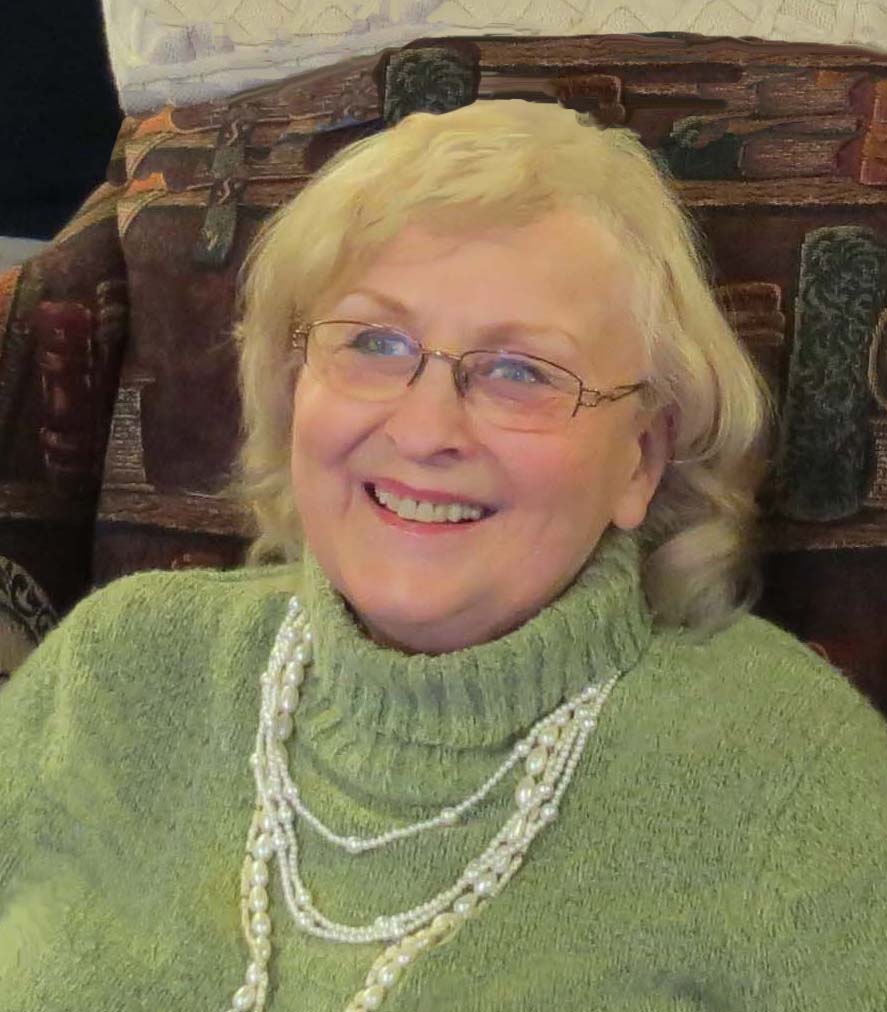 Sister, student, spouse,
Sister, student, spouse, 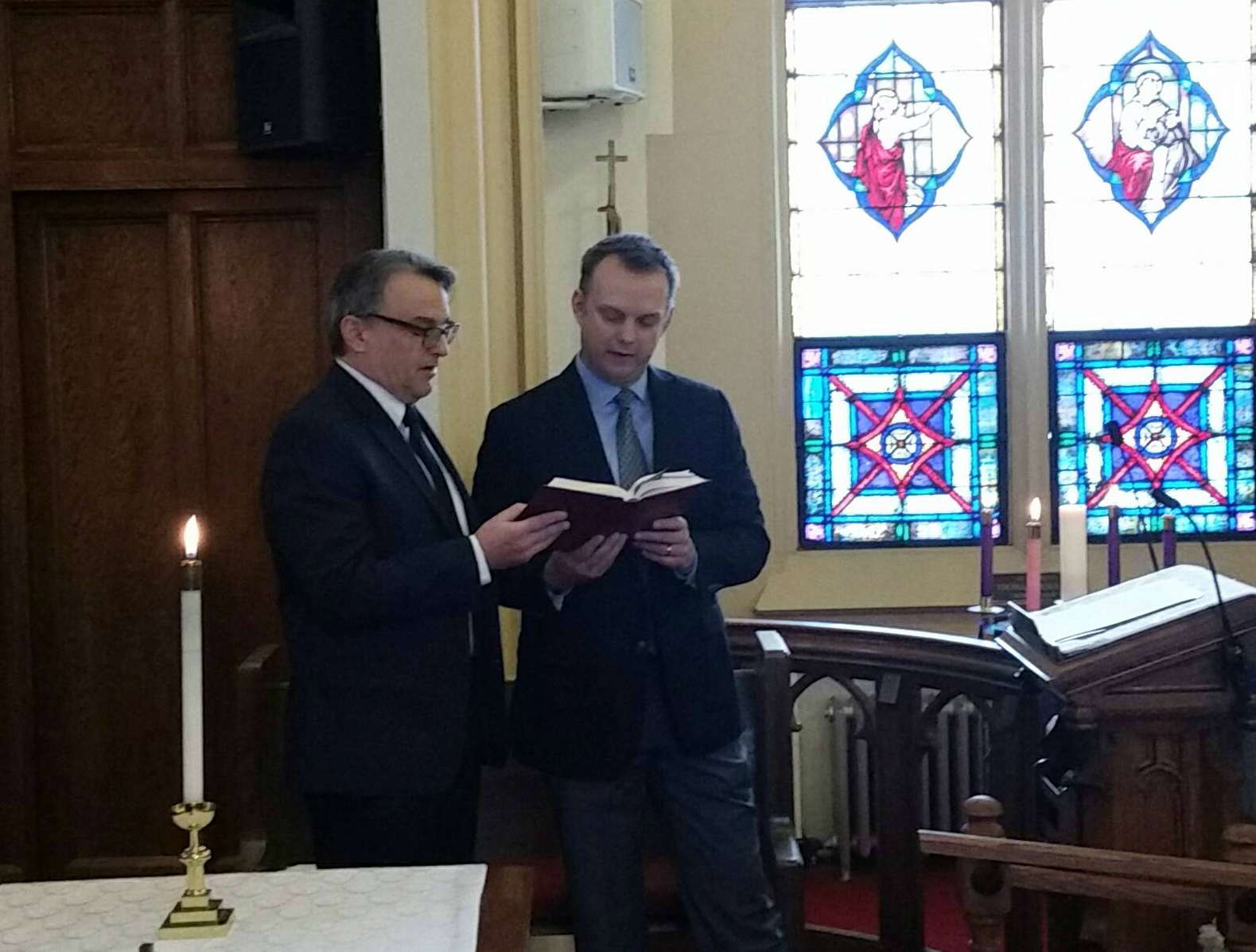
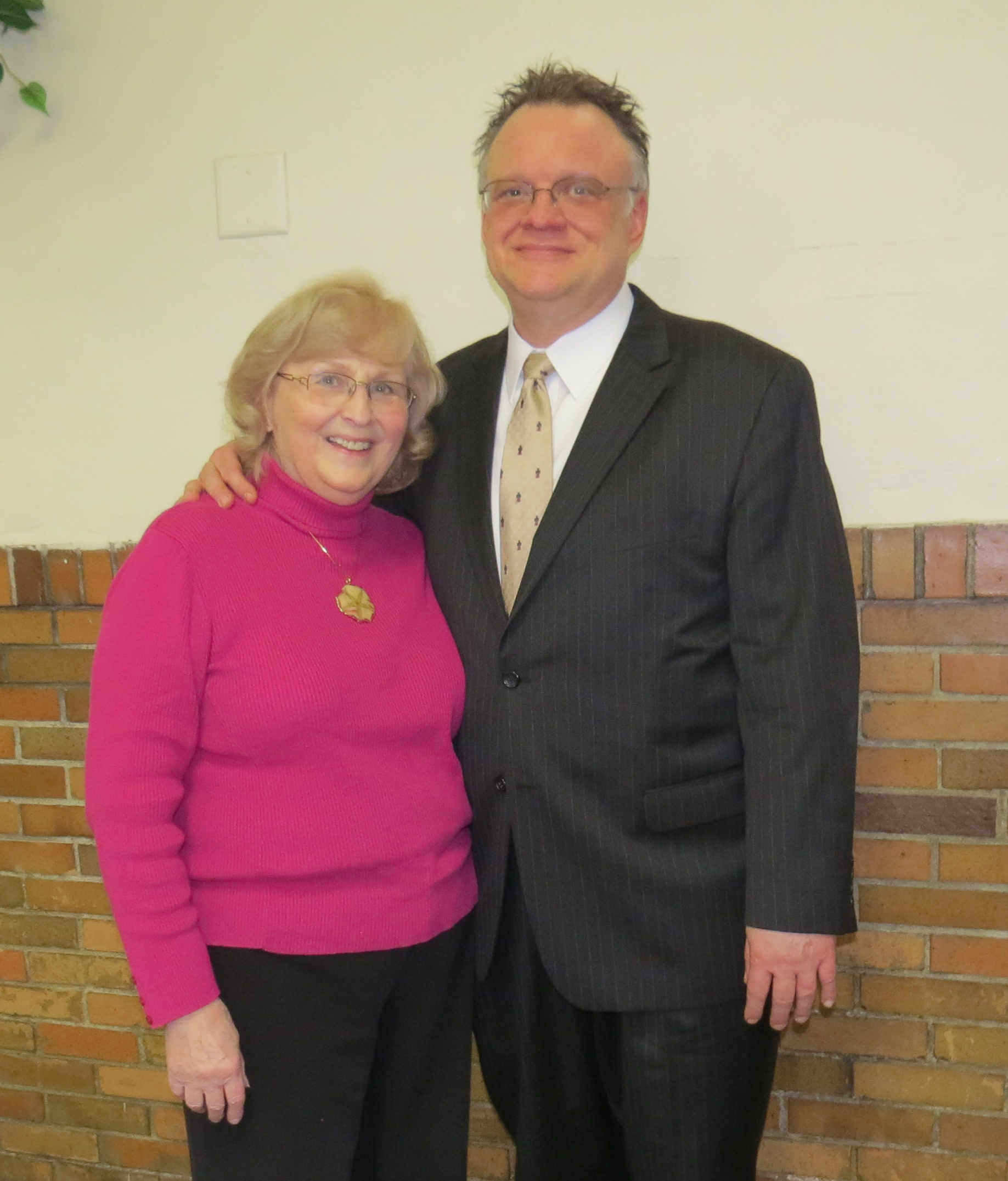 Even though we know God’s power and love make Mary Lu as real and present to God as she ever was to us in this life. We still hurt, we groan inside too deep for words at her absence from our human senses. I have no prayers to answer the questions or fill in the blanks left by Mary Lu’s passing, we have to rely on God’s spirit to bridge that gap between the twin realities our aching loss and God’s amazing grace. For I cannot take away the pain that you feel at Mary Lu’s passing. For love and grief are different sides of the same coin, they are joined in this life, the only way to not receive grief is to reject the gift of love. Even Jesus wept at the passing of his friend, Lazarus. When we lose someone we love we grieve. So to deliver you from the grief you feel I would have to eliminate the love that you have for Mary Lu. You wouldn’t want me to do that even if I could. But what I can tell you that Mary Lu is at rest, free from the weakness of disease, and she is at home with the Lord, breathing easy.
Even though we know God’s power and love make Mary Lu as real and present to God as she ever was to us in this life. We still hurt, we groan inside too deep for words at her absence from our human senses. I have no prayers to answer the questions or fill in the blanks left by Mary Lu’s passing, we have to rely on God’s spirit to bridge that gap between the twin realities our aching loss and God’s amazing grace. For I cannot take away the pain that you feel at Mary Lu’s passing. For love and grief are different sides of the same coin, they are joined in this life, the only way to not receive grief is to reject the gift of love. Even Jesus wept at the passing of his friend, Lazarus. When we lose someone we love we grieve. So to deliver you from the grief you feel I would have to eliminate the love that you have for Mary Lu. You wouldn’t want me to do that even if I could. But what I can tell you that Mary Lu is at rest, free from the weakness of disease, and she is at home with the Lord, breathing easy.





 Christy Ramsey
Christy Ramsey



